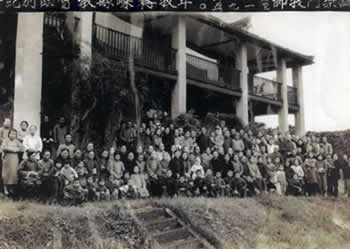Older church members will recall the pastorate of Heath Presbyterian Church held by Rev. Jack Sharman from 1954-1961. His daughter Ceri, now Ceri Douglass, has produced three booklets giving an account of her father and mother’s service with CIM as missionaries from 1937-1951 in China, their escape from Communism and return to Wales in 1951.
During all the years spent in China Jack Sharman wrote hundreds of letters to his sister and aunts in Wales, one of whom was Miss Jarvis, an elder of Heath during the years of the Second World War.
Ceri and her husband determined to visit the area in China during 2000 where her parents and family were situated and nurturing the flourishing church, as shown in a photograph taken in 1951 prior to the Communist take-over. To their amazement, not only did the church still exist, but it had wonderfully survived 50 years of persecution and numbers are rapidly increasing daily.
A second visit to China in 2006, with the daughter of missionaries who served in the same period as the Sharmans, revealed the whereabouts of places and people who were well known to Ceri’s parents.
The three booklets are entitled ‘Memoirs of Jack and Pegi Sharman’, ‘The People in the Picture’ and ‘He maketh a New Vessel’. These can be read in sequence or individually as the narrative overlaps in various details; but one thing is certain, they make very realistic and exciting reading about our former Pastor, and it is so encouraging to discover how God is powerfully working in this immense Chinese nation in our time.
Richard Coombe
To obtain the booklets, please contact: Mrs. Ceri Douglass, 90 Wembdon Road, Bridgewater, Somerset, TA6 7QS
W K Sharman was born in Neath in 1909 and became known as “Jack”.At the tender age of 8, both his parents had died and he was cared for by his mother’s two unmarried sisters, Kate and Tegwen Jarvis. He was brought up in the Neath Mission Hall where for some time Frank Joshua was the famous minister. He was converted at the age of 17 and eventually began to realize that God was calling him to serve Him in China.
After farewell meetings in Neath, and also at Heath, where his aunts had moved to, he set sail for China in 1934, the year that John and Betty Stam were martyred. Pegi Robson was born in Aberavon in 1910 into a most godly family who attended the church where Dr Martyn Lloyd-Jones was minister.
Under his ministry, Pegi realized that there was more to being a Christian than attending church and she admitted she would leave the weekly Bible study during the last hymn to avoid shaking hands with him at the door! However,she came to faith at the age of 20 and then began to earnestly seek God’s guidance. She wrote:“Sitting beside the fire late one night with my mother, I told her that I believed that God would have me become a missionary. Her eyes filled with tears as she said,‘I offered you to the Lord Jesus before you were born’” – see A Mother’s Covenant p11. Pegi trained with CIM and left for China in 1936 along with 12 other women recruits.
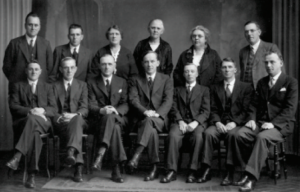
Bethlehem Chapel, Sandfields,Aberavon: Dr Martyn LloydJones,seated centre front row; Pegi’s mother,Violet Robson, back row, lady on the right with glasses
Jack and Pegi had met just once before meeting again in China, but Jack had fallen in love on that one occasion. Soon after her arrival, he wrote to his aunts and sister,“For some months I have been very conscious that the lady of the Lord’s choice for me in China is Miss Robson of Aberavon …The Lord had been leading her too towards me.The Lord wonderfully undertook in the talk we had … I cannot but praise Him for His grace. It means that we are engaged …”
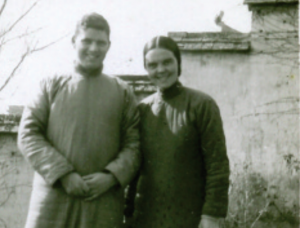
Jack and Pegi
They got married the following year, 1938, in Shanghai Cathedral and witnessed great success in their Gospel work in Chenghsien (since renamed Shengzhou) in Zhejiang Province in the following 7 years. This was the time of the Japanese invasion of China and their military advance was a constant concern. Pegi wrote:“After our wedding, we were stranded in Shanghai for a few weeks because the China coast was blockaded.A few small ships were running the blockade,so we decided to try and get away on one of them … A few days’ ‘overland’ travel and we reached our first home in Chenghsien … it was an enriching year; opportunities to tell the Gospel abounded, and the refugees fleeing from the war into the interior proved a fulfilment of the Psalmist’s word,‘Surely the wrath of man will praiseThee’ … In our area we were free to go wherever we wished; it was a thrilling time.We visited villages in many places and held meetings.Years later we were able to record that besides our city church there were 64 village congregations.” During the course of their first ministry,that city church grew from just a handful to about 500 members and with 21 village churches in the local county. Sadness struck the family with the death of their first born, Kathryn, at the age of just 2, to dysentery. Two boys were born, Hugh and Wynne, who remained healthy and well and a joy to their parents.
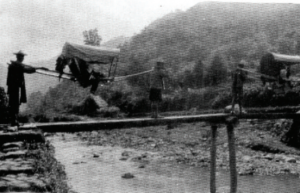
Emergency travel for baby Kathryn to hospital
But the gradual advance of Japanese troops was a cause of great sadness too, which meant that in 1942 they had to seek refuge in another city,Tientai, a day and half of walking with two small boys over a mountain pass.Their city emptied as it was being bombed.They were safe until 1944 when Japan enteredWorldWar 2, when all expatriates were declared illegal aliens. So they had to flee.The shortest route would be east to the coast, but that was cut off, and so the long trek from east to west across China to Burma to India was undertaken.This is best described by Pegi herself.
The first escape from China
It was the last few days of June 1944. Already days and nights were very hot and sticky. Humidity was high and we were grateful to be in a settled home in Tientai, where we had been for quite a few months.We were rejoicing in the fellowship of the little church and the obvious change in some of the male inmates in the prison. During the afternoon of June 30th, a message came from the local Mandarin for Jack to go to the post office because there was an urgent message for us.What was going to be asked of us? Jack came back quite soon to tell me that the Japanese had made another thrust southwards from Changsha, and it looked as though they were trying to cut China in two, thus cutting off any escape route from East China.Also, the nearest British consul (a few hundred miles away) was seriously ill and could not leave his post until the last British residents under his care had left.Would we be prepared to leave as soon as possible? I was terribly afraid of travelling across China with two small children at the hottest time of the year, but had the mno options and we decided on that Thursday afternoon that we would aim to leave on July 4th. So enabling us to have the weekend to pack what we would need for the long journey from East toWest China and eventually to India and hopefully back toWales. It also gave us time to wish our fellow Christians goodbye on Sunday and leave in the early hours of Monday.
In our morning Bible reading that day we had read again, Psalm 121,the Psalm we had chosen to sing at our wedding,As we set out on this journey we believed that would make the promise of God in verse 6 real to us.
‘The sun shall not smite you by day, nor the moon by night’
When we set out on our journey of many thousands of miles we had no idea of what transport would be available. But we did know that we had the promise that ‘As our days so would be our strength’. Some days we would be mostly walking; for this we carried a small towel that we would soak in any pool or stream and place over our heads to help keep us cool.We also carried an earthenware jar, which we filled with boiled water for each day’s drinking. The first six days we did by sedan chair until we reached Lishen, travelling through the most spectacular mountain ranges. Sometimes we got lifts on trucks and that helped us cover more miles; there were rafts too on the waterways.These were made of bamboos strung together and were in constant use for the transporting goods.
Occasionally we had the excitement of negotiating rapids, which Hugh loved. Other times we would squeeze into big flat-bottomed punts,the boatmen would heave the boats forward using long punting poles, or sometimes they paddled with crude oars made of pieces of rough wood tied to a pole.Travelling across dry land was slow;the bumpy roads were mere rough tracks. Sometimes the boys and baggage were pulled along in handcarts hauled along slowly by Chinese men.We had wonderful hospitality en route,sometimes staying with Christians in humble rooms with thatched roofs and mud walls. One night we shared the room with the family pig. We were aiming to reach the place where the British Military Mission was stationed; it took us three months on the road to eventually reach it.
There, we were greatly helped by their kindness for they took us by truck to the nearest American air base. It was a bit ofAmerica in China.The GIs were so pleased to see the children and set themselves to spoil them.At three, Hugh had his first taste of chocolate.We were given the most wonderful food that we had forgotten existed.They even had a jukebox to add to the fun.After a day or two they flew us over enemy lines in a Dakota to another base, and finally toWest China. Once there we took a Chinese CivilAviation plane across the ‘Hump of Burma’ and into India. By this time we had very little money and a minimum of possessions,so Wynne was weighed in lieu of baggage.
At Calcutta airport we hired a taxi that was driven by a very fine looking Sikh. Hugh looked at his fine turbaned head and asked,“Is it Jesus who is taking us?” He must have thought that‘the One’ we had thanked so often along our way had come in flesh for the last lap of help for us.
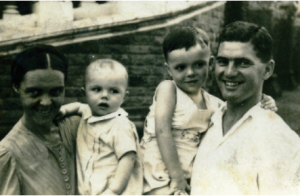
None of us had been unwell at all during our journey, in spite of the heat and the hardness of the way, but within a few weeks of being in India we were to have a new experience.We stayed with some very hospitableAmericans in a beautiful bungalow in central India. Jack and the boys were taken ill with tummy bugs and hospitalised.Two of them recovered quickly but Wynne grew weaker and weaker.TheAngloIndian doctor, who was looking after him,took my arm one day and told me that she had tried everything in her power to save him and it seemed that we were going to lose him.That evening, a little group of elderly lady missionaries gave themselves to prayer with us.As we knelt beside his bed we read Psalm 50 v 15: ‘Call upon me in the day of trouble, I will deliver you and you shall glorify me’
I said,“Lord if you do deliverWynne, I will indeed give you the glory”.Wynne had a peaceful night and when the new day started all symptoms had gone and in a few days he was well enough for us to cross India by train to Bombay. We were delayed there for many weeks because there was no transport to England, but it gave us time to meet many Christians and enjoy sweet fellowship.Amongst those new friends were Isobel Kuhn and her little boy. He had also not been well and she was concerned that there was no suitable food for travelling with a small child. I had a whole case of baby food that our doctor had got forWynne when he left hospital,so Danny Kuhn was also provided for.
One day in December 1944, we were told there was room for us on a British Navy troopship bound for England.We sailed in a twenty-twoship convoy and even had an aircraft carrier escort for part of the journey. During this journey we experienced another lesson in that God gives help to His servants in the least expected ways.
It was a cold January afternoon in January 1945, the platform and Station Square at PortTalbot were filled with members from Bethlehem Chapel, Sandfields.They were there to welcome us from the London train, a little family for whom they had faithfully prayed for a long time We stepped from the train dressed in clothes we had taken to China. My coat, bought in 1936, was not as threadbare as Jack’s suit with knee-darned trousers. Our clothes looked much like those of the Children of Israel, but in their 41st year of existence!We felt a little shy of the large crowd of loving people because it had just been the Chinese and us for so many years. .
We were soon driven to my family home where friends had brought so many love offerings by sharing their meagre rations with us. My mother said she felt she should have written above the door,‘Come ye thankful people come’.We were thin and worn looking, but clothing coupons were shared too and patched trousers were replaced and a new coat produced for our welcome home service the following Sunday. To be ministered to by Dr Martyn Lloyd Jones our minister, who became our beloved friend is one of the lovely memories of that time.We had been giving out year after year with no holidays or opportunities to receive; now we were drinking in messages that brought us renewal.
Little prayer groups who had prayed about the tiny details of our lives as well as sharing in the big issues,shared with us times when God had laid special needs on their hearts. One elderly lady asked me if there had been any problems in getting water for our needs on the troop ship which brought us home, because God had laid it upon her heart to pray for water. I told her that we had been allowed only a small ration of water, but soon after we boarded the ship an Indian steward had asked if I would like an extra can as he had noticed I had two small children. Every day that extra can came.There in Neath I was to understand the reason why I was the only passenger to receive extra; God is concerned about the details of our lives; it does matter to Him about us and He does answers prayer.
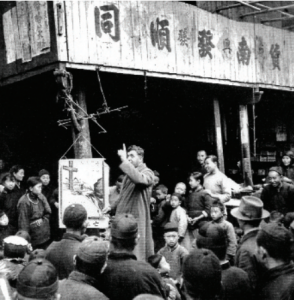
Back to China
With the end ofWorldWar 2 and the defeat of the Japanese, Jack and a few other CIM men sailed to India at the end of 1945 and then on to China to survey the work and see if missionaries were still wanted.The answer wasYes, and so Pegi and the two boys made their own way out a year later. But there was trouble in India and this caused considerable delay, but eventually they were together as a family again, back in Chenghsien. Jack in his determination quoted the words of Jesus,“I must work the work of Him who sent me while it is day, for the night cometh when no man can work” (John 9:4).They felt with Paul,“A door was opened to me of the Lord” (2Cor 2:12).
Pegi wrote:“The doors for ministry remained wide open for a further two years, but in Spring 1948 news began reaching us of unrest and there was an evident cloud of fear over people … In the big city there was evident tension, prices rose sharply and rumours were rife …The city filled with soldiers who had come down to fight the Communists …We felt our time in China was not going to be much longer”. However,they witnessed the greatest number of baptisms ever during that following year.
Jack wrote to his aunts in 1949,“Last Saturday government troops that were stationed in the city began to move out,so that by evening there were no troops, no curfew bell rang … Sunday morning we were awakened by the sound of firing about 4 or 5 miles east of the city.We had our usual early morning prayer meeting at the church.At 7.30 am a friend walked in to say that the ‘People’s Liberation’ army had arrived and taken over.That morning we had a service as usual but of course no one from outside the city came, although practically every Christian home in the city was represented and with over 60 people there.…” Later, he had the joy of reporting that 95 people were baptized one Sunday, 49 men and 46 women.“If we told you all the wonderful things God has done, a book would not be sufficient, but this verse has been much with us:‘He made it again a new vessel’”.
Despite the Communists’ promise of freedom of religion, Jack was increasingly hampered in his visits to village churches, but they were increasingly able to support themselves.The final blow came when they received an order in October 1950,telling them that the following Sunday would be the last time they could meet for worship.“Words fail to express the atmosphere of that morning service. Pastor Chang spoke on ‘Peace I leave with you; my peace I give unto you; not as the world gives do I give to you. Let not you heart be troubled, neither let it be afraid’.We were only allowed one hour before the army took occupation of our church. Each went to their own homes and many of us may never meet again, but we anticipate a wonderful reunion when we gather around His throne in glory.”
By then their two boys were in boarding school and their little daughter, Ceri, was 2. Pegi picks up the story again.
The second escape from China
Your sons shall come from far and your daughters will be carried in your arms - Isaiah 60 v 4
December 8th started like every other apprehensive one. Jack went out to make a purchase and whilst he was away a military messenger came to tell us that our permits to travel had been granted and we were to leave early the next day and travel to reach Shanghai before midnight of the 9th. It would be a tedious journey by bus to Hangchow and then train.
Hastily we gathered things together and with heavy hearts prayed for the boys. Darkness had fallen and we were making an inventory of what we were leaving for the new government, when a loud knocking at the door startled us.
Who could it be knocking so urgently?We went to the door to find a post office worker with a smile across his face and a telegram in his hand and before we could read it he had shared the message,‘Your children with escort have left Kuling today for Hong Kong.’They were three days journey away, in a different province of China and their permission to travel had been issued by a different authority.We were only hours away from our journey to Shanghai and the boys had left before us. It would be about six weeks before we would see them but with hearts at peace we knew that God had ordered their paths and ours.
We reached Shanghai just before midnight but to do so we had to leave a lot of things behind. There was one box that we had long since left stored in Hangchow.At such times one is not torn in leaving things! Once in Shanghai we had to apply for passes to leave the country which again was most difficult, we went to bed most nights hoping that we might be more successful tomorrow.Weeks passed before we got our pass and when they came we were told we must travel up to the northern port ofTientsin.There we once again started looking for a ship to Hong Kong. It would have been so much easier to travel by train from Shanghai to Hong Kong, but we had to obey orders.
On the morning we received our travel permit, we had a letter saying the baggage we had left in Hangchow had been forwarded by a Chinese friend and was waiting to be collected. Jack went in one direction to buy our rail tickets and Ceri and I went another way to collect the precious cases.There were lots of people like us waiting to be attended to.Two-year-old Ceri got bored so started to dance and sing a song she had heard at many of the political demonstrations she had witnessed in Chekiang. No sooner had she started than a young man hurried to me and asked,“Where do you come from?This child sings in my dialect”.With no further delay he found our baggage, had it stamped and handed
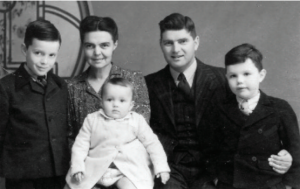 over to me.Within a few days we were on the three-day train journey toTientsin. It became
colder as we went northwards, all we were wearing were the clothes that had been adequate for the milder weather of south China. On arrival, Swedish missionaries took us into their home and lovingly shared a lovely Swedish Christmas with us.Warmer clothes were purchased,ship offices were visited and tickets obtained for the last ship to leave port that winter.The temperature was 18 degrees below zero.The sea was frozen and the ship had ice on all the cabin walls, but we sailed on time and two weeks later sailed into Hong Kong to be met by Hugh and Wynne.
over to me.Within a few days we were on the three-day train journey toTientsin. It became
colder as we went northwards, all we were wearing were the clothes that had been adequate for the milder weather of south China. On arrival, Swedish missionaries took us into their home and lovingly shared a lovely Swedish Christmas with us.Warmer clothes were purchased,ship offices were visited and tickets obtained for the last ship to leave port that winter.The temperature was 18 degrees below zero.The sea was frozen and the ship had ice on all the cabin walls, but we sailed on time and two weeks later sailed into Hong Kong to be met by Hugh and Wynne.
Within days a liner was to sail to Britain and we were able to book a cabin on her.That was the most wonderful journey we had taken for a long time.Throughout our years in China, both our families had constantly prayed for us.A few moments after arrival in Jack’s home in Cardiff, I was shown the Keswick calendar for December 12th 1950. On that morning both aunts,Kate and Teg, had woken with the burden to pray for our release from China lifted,they had an inexplicable peace and joy in their hearts. Under the text for that day from Psalm 121:7-8,they wrote “We believe our family is free.”
Back in Cardiff
God had fresh plans for Jack and Pegi Sharman here in Cardiff. He was ordained a minister of the Presbyterian Church ofWales and spent time first at Saltmead,then at Clive Road and finally, for 7 years at Heath. In 1961,they were asked to serve in the London HQ of the Overseas Missionary Fellowship, as CIM was now known, which they did for 6 years before moving to a church inAbergavenny, where his ministry was 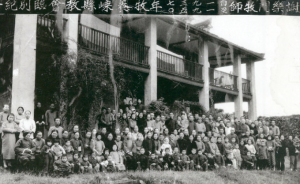 again richly blessed. However, it was short lived as he passed away in 1968, but the church had been revived. Pegi managed a brief visit to China in 1984 when she could see for herself that the church had not only survived the rigours of life under Communism and the so-called ‘Cultural Revolution’, but was thriving. So she knew that their daily prayers for China had been answered even though at times it seemed as though the heavens were as brass. Pegi passed away 30 years later than Jack, in 1998.
again richly blessed. However, it was short lived as he passed away in 1968, but the church had been revived. Pegi managed a brief visit to China in 1984 when she could see for herself that the church had not only survived the rigours of life under Communism and the so-called ‘Cultural Revolution’, but was thriving. So she knew that their daily prayers for China had been answered even though at times it seemed as though the heavens were as brass. Pegi passed away 30 years later than Jack, in 1998.
The church photograph on p10 was taken as a memento on the Saturday afternoon before their last Sunday before the church building was taken over for Government use. Ceri remembers that this picture stood on her father’s desk in the new manse in Allensbank Road. She recalls:
Dad use to go into his study every morning at 9am, just like any other man going to work.Much of that time on his knees, and we weren’t allowed to disturb him, until 11am when Mum joined him with coffee and shortbread and we were allowed to be there. It was their time for praying for the friends they had left in China.They would read their Chinese Bibles together and pray in Chinese.They would work through the faces in the picture, praying specifically by name for a few every day. I use to laugh at the funny names, but Mum never forgot a single one, even as she grew older and suffered fromAlzheimer’s.
The photo was precious as they felt that each person standing there could have been marked as a counter revolutionary.
Ceri and her husband,Andy Douglass visited these people in 2000.“They just loved to identify themselves and their families. So much had been lost in the Cultural Revolution, during those years, but this precious photo had been safe on the front room of 2 Allensbank Rd. In an enlarged copy, it is on the walls of the churches in Shengzhou, where my parents ministered and many of the children in the picture are leaders.”
The church was packed and had clearly outgrown its old rickety building in the heart of the city.The Government wanted the land for a cultural centre and agreed to plans for a brand new building. Just look at it! No, it’s not a French chateau, but a cathedral sized building with seating for 3,500, five storeys with rooms for Sunday Schools, midweek meetings, library, Bible school, etc.What God has done in Gospel love for the people of China over the past two centuries is utterly extraordinary, with reports of over 100,000,000 born again believers in that land alone.
We are indebted to Ceri Douglass for compiling three books about her parents’ ministry from her father’s letters sent to his aunts at Heath, her mother’s reminiscences and from her own visits to the places where they served in China.They tell far more of the story of their ministry than this article can say.Read them and be moved by how a former family of the church was part of that amazing mission to serve China’s Millions.
Regard them as part of the heritage of our church.They will cost £5 each.The first book has been translated into Chinese.

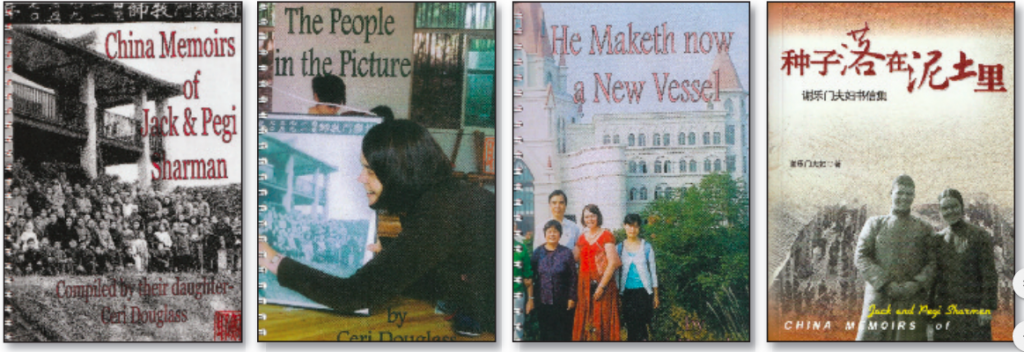
October 2019

